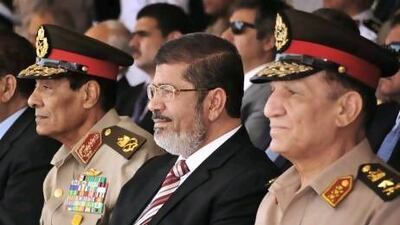CAIRO // Mohammed Morsi yesterday ousted the defence minister, Field Marshall Hussein Tantawi - once the most powerful man in Egypt - along with the chief of staff of the armed forces and the heads of the navy and air force.
The Egyptian president ordered the four men to retire, and also scrapped a military-issued constitutional document that limited his control over the armed forces.
The move was the clearest sign yet that Mr Morsi is willing to confront the army in a bid to cement his authority. Gen Tantawi and Lt Gen Sami Anan, the chief of staff, had been seen by many as a liberal counterbalance to Mr Morsi's expected ambitions to transform Egypt into a more Islamist state.
Gen Tantawi took control after Hosni Mubarak resigned amid an uprising against his regime last year. He and Gen Anan will become Mr Morsi's advisers after their retirement, the president's spokesman, Yasser Ali, said yesterday.
The military issued no statement, but one general said Mr Morsi's decision had been taken after consultation with the leaders of Scaf, the Supreme Council of Armed Forces.
"Given the circumstances, this is the right time to make changes in the military institution," said Mourad Ali, a senior official with the Muslim Brotherhood's Freedom and Justice Party, which fielded Mr Morsi in a May-June presidential election. "He is a strong president, and he is exercising his authority."
The president also announced that he was nullifying a constitutional addendum issued by Scaf under Gen Tantawi that stripped the president of any powers over military affairs and made Scaf the de facto legislative power.
The addendum had been described as a "soft coup" at the time by critics of military rule because it unilaterally weakened the presidency before Mr Morsi had even taken power. It was seen as a pre-emptive attack on an Islamist presidency.
Mr Morsi also appointed Mahmoud Mekky, a judge with a long history of pushing for the independence of the judiciary, as his vice president. Mr Mekky is the brother of the new minister of justice, Ahmed Mekky.
Both men have been critical of the role played by the Supreme Constitutional Court this year, especially after its judges ruled that parliament should be disbanded because a third of the members of parliament were unconstitutionally elected.
The Freedom and Justice Party had said the decision was politically motivated because it undermined the parliament just days before presidential elections.
Yesterday's announcements are a bold and potentially polarising strategy to restore the powers of the presidency. "The balance of power has shifted dramatically toward the Muslim Brotherhood and the president," said Abdel Moneim Said Aly, head of the state-run Al Ahram Centre for Strategic and Political Studies.
"The president has shown his ability to control the country in a sweeping way."
However, taken together with a crackdown on independent media that had been critical of Mr Morsi and the Brotherhood in the past few weeks, they also revived fears that Egypt was returning to the style of strongman presidents that held nearly totalitarian control over the country for more than 60 years.
A popular television show was shut down last week, accused of inciting violence "on behalf of the ousted Mubarak regime", and an independent newspaper, Al Dustour, had editions seized by authorities after several lawsuits accused its owners of "fuelling sedition".
Hisham Kassem, a veteran independent publisher in Egypt and a political commentator, said the Muslim Brotherhood "are much worse than Mubarak when it comes to accepting criticism".
"Their threat perception is very high," he said. "I think we are going to see more repression, but we will face it with severe opposition."
Mr Morsi appointed Abdel Fatah El Sisi, former head of military intelligence, as the new minister of defence, and Sedky Sobhy, formerly the commander of the third army, as the chief of staff of the armed forces.
*With additional reporting by Agence France-Presse and Reuters

